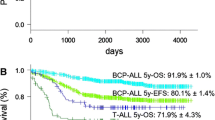Abstract
Acute lymphoblastic leukemia (ALL) is a common neoplasm in children, but less frequent in adults. Since information on clinical features and genetics of adult ALL in Japan is limited, we analyzed 215 subjects aged 16–65 years with untreated ALL enrolled in the Fukuoka Blood & Marrow Transplant Group studies ALL MRD 2002 and 2008. The prevalence of ALL was bimodal, with the larger group aged 56–65 years. Immunophenotypic characterization showed B-lineage is more frequent than T-lineage ALL (78.6 vs 13.0%), with age-related differences. The proportion with BCR-ABL1 rearrangement increased progressively with age, up to 55.7% among subjects aged over 56–65 years. Rearrangements involving the KMT2A gene, ETV6-RUNX1, and TCF3-PBX1 were rare in this study cohort. The overall incidence of hyperdiploidy was only 1.7%, and there were no cases with hypodiploidy. Overall survival varied by age and cytogenetics. Older subjects and those with BCR-ABL1 tended to have inferior outcomes. In this epidemiological study of Japanese adult ALL, the majority of subjects had B-lineage ALL, the T-cell phenotype was most frequent in those aged 16–25, and BCR-ABL1 rearrangement was very common, with prevalence increasing with age. These types of adult ALL are potentially manageable with targeted therapies.



Similar content being viewed by others
References
Howlader N, Noone A, Krapcho M, Miller D, Bishop K, Kosary C, et al. SEER cancer statistics review (CSR) 1975–2014. Bethesda, MD: National Cancer Institute; 2017.
Redaelli A, Laskin BL, Stephens JM, Botteman MF, Pashos CL. A systematic literature review of the clinical and epidemiological burden of acute lymphoblastic leukaemia (ALL). Eur J Cancer Care (Engl). 2005;14:53–62.
Iacobucci I, Mullighan CG. Genetic basis of acute lymphoblastic leukemia. J Clin Oncol. 2017;35:975–83.
Moorman AV, Harrison CJ, Buck GA, Richards SM, Secker-Walker LM, Martineau M, et al. Karyotype is an independent prognostic factor in adult acute lymphoblastic leukemia (ALL): analysis of cytogenetic data from patients treated on the Medical Research Council (MRC) UKALLXII/Eastern Cooperative Oncology Group (ECOG) 2993 trial. Blood. 2007;109:3189–97.
Moorman AV. The clinical relevance of chromosomal and genomic abnormalities in B-cell precursor acute lymphoblastic leukaemia. Blood Rev. 2012;26:123–35.
Burmeister T, Gokbuget N, Schwartz S, Fischer L, Hubert D, Sindram A, et al. Clinical features and prognostic implications of TCF3-PBX1 and ETV6-RUNX1 in adult acute lymphoblastic leukemia. Haematologica. 2010;95:241–6.
Garg R, Kantarjian H, Thomas D, Faderl S, Ravandi F, Lovshe D, et al. Adults with acute lymphoblastic leukemia and translocation (1;19) abnormality have a favorable outcome with hyperfractionated cyclophosphamide, vincristine, doxorubicin, and dexamethasone alternating with methotrexate and high-dose cytarabine chemotherapy. Cancer. 2009;115:2147–54.
Mancini M, Scappaticci D, Cimino G, Nanni M, Derme V, Elia L, et al. A comprehensive genetic classification of adult acute lymphoblastic leukemia (ALL): analysis of the GIMEMA 0496 protocol. Blood. 2005;105:3434–41.
Mrozek K, Harper DP, Aplan PD. Cytogenetics and molecular genetics of acute lymphoblastic leukemia. Hematol Oncol Clin North Am. 2009;23(991–1010):v.
Roberts KG. Genetics and prognosis of ALL in children vs adults. Hematology Am Soc Hematol Educ Program. 2018;2018:137–45.
Meyer C, Kowarz E, Hofmann J, Renneville A, Zuna J, Trka J, et al. New insights to the MLL recombinome of acute leukemias. Leukemia. 2009;23:1490–9.
Nagafuji K, Miyamoto T, Eto T, Kamimura T, Taniguchi S, Okamura T, et al. Monitoring of minimal residual disease (MRD) is useful to predict prognosis of adult patients with Ph-negative ALL: results of a prospective study (ALL MRD2002 Study). J Hematol Oncol. 2013;6:14.
Nagafuji K, Miyamoto T, Eto T, Ogawa R, Okumura H, Takase K, et al. Prospective evaluation of minimal residual disease monitoring to predict prognosis of adult patients with Ph-negative acute lymphoblastic leukemia. Eur J Haematol. 2019;103(3):164–71.
Cataland SR, Daugherty CK, Weseman EC, Larson RA. Preliminary experience with a new chemotherapy regimen for adults with acute lymphoblastic leukemia. Leuk Lymphoma. 2009;41:297–307.
Stock W, Johnson JL, Stone RM, Kolitz JE, Powell BL, Wetzler M, et al. Dose intensification of daunorubicin and cytarabine during treatment of adult acute lymphoblastic leukemia: results of Cancer and Leukemia Group B Study 19802. Cancer. 2013;119:90–8.
Kanda Y. Investigation of the freely available easy-to-use software “EZR” for medical statistics. Bone Marrow Transplant. 2013;48:452–8.
Moorman AV, Chilton L, Wilkinson J, Ensor HM, Bown N, Proctor SJ. A population-based cytogenetic study of adults with acute lymphoblastic leukemia. Blood. 2010;115:206–14.
Siegel SE, Stock W, Johnson RH, Advani A, Muffly L, Douer D, et al. Pediatric-inspired treatment regimens for adolescents and young adults with philadelphia chromosome-negative acute lymphoblastic leukemia: a review. JAMA Oncol. 2018;4:725–34.
Kebriaei P, Saliba R, Rondon G, Chiattone A, Luthra R, Anderlini P, et al. Long-term follow-up of allogeneic hematopoietic stem cell transplantation for patients with Philadelphia chromosome-positive acute lymphoblastic leukemia: impact of tyrosine kinase inhibitors on treatment outcomes. Biol Blood Marrow Transplant. 2012;18:584–92.
Fielding AK, Rowe JM, Buck G, Foroni L, Gerrard G, Litzow MR, et al. UKALLXII/ECOG2993: addition of imatinib to a standard treatment regimen enhances long-term outcomes in Philadelphia positive acute lymphoblastic leukemia. Blood. 2014;123:843–50.
Thomas DA, Faderl S, Cortes J, O’Brien S, Giles FJ, Kornblau SM, et al. Treatment of Philadelphia chromosome-positive acute lymphocytic leukemia with hyper-CVAD and imatinib mesylate. Blood. 2004;103:4396–407.
Hatta Y, Mizuta S, Matsuo K, Ohtake S, Iwanaga M, Sugiura I, et al. Final analysis of the JALSG Ph+ALL202 study: tyrosine kinase inhibitor-combined chemotherapy for Ph+ALL. Ann Hematol. 2018;97:1535–45.
Author information
Authors and Affiliations
Corresponding author
Additional information
Publisher's Note
Springer Nature remains neutral with regard to jurisdictional claims in published maps and institutional affiliations.
About this article
Cite this article
Morishige, S., Miyamoto, T., Eto, T. et al. Clinical features and chromosomal/genetic aberration in adult acute lymphoblastic leukemia in Japan: results of Fukuoka Blood & Marrow Transplant Group Studies ALL MRD 2002 and 2008. Int J Hematol 113, 815–822 (2021). https://doi.org/10.1007/s12185-021-03116-8
Received:
Revised:
Accepted:
Published:
Issue Date:
DOI: https://doi.org/10.1007/s12185-021-03116-8




